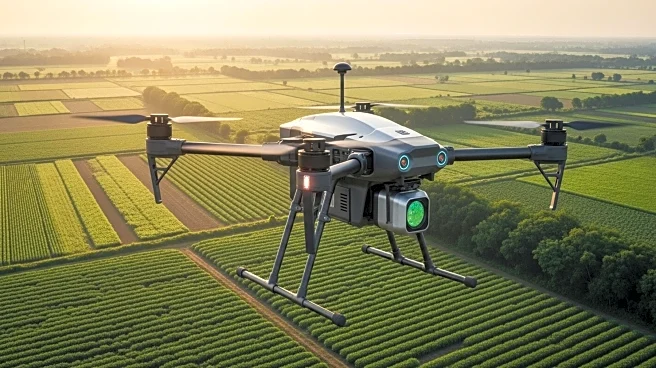What's Happening?
The global precision farming market is anticipated to grow significantly, with projections estimating its value to reach $21.45 billion by 2032, up from $11.38 billion in 2025. This growth is expected to occur at a compound annual growth rate (CAGR) of 9.5%. The market's expansion is driven by the increasing global demand for food, the impacts of climate change, and the necessity for sustainable agricultural practices. Precision farming integrates technologies such as the Internet of Things (IoT), artificial intelligence (AI), and blockchain to enhance farm productivity through real-time data and predictive analytics. Key applications include variable rate application, yield monitoring, and livestock tracking. While urban areas are quick to adopt these technologies due to advanced infrastructure, rural regions face challenges like connectivity gaps. However, improvements in digital infrastructure and government initiatives are helping to bridge this divide.
Why It's Important?
The growth of the precision farming market is significant for several reasons. It represents a shift towards more sustainable agricultural practices, which are crucial in addressing the challenges posed by climate change and the increasing global food demand. By utilizing advanced technologies, precision farming can optimize resource use, reduce environmental impact, and increase crop yields. This technological integration is particularly beneficial for large-scale farming operations, which can improve efficiency and reduce labor dependency. The market's expansion also highlights the potential for economic growth in the agricultural sector, providing opportunities for technology companies and farmers alike. As more regions improve their digital infrastructure, the adoption of precision farming technologies is expected to increase, further driving market growth.
What's Next?
The precision farming market is likely to see continued growth as technological advancements make these solutions more accessible and effective. Future developments may include increased use of AI-powered automation, drone-based monitoring, and data-driven farming solutions tailored for smallholder farmers. As connectivity improves in rural areas, more farmers will be able to access real-time data, enhancing their ability to make informed decisions. Additionally, government initiatives promoting sustainable agriculture are expected to support the adoption of precision farming technologies. Major players in the industry, such as Deere & Company and AGCO Corporation, are likely to continue investing in research and development to maintain their market leadership.
Beyond the Headlines
The rise of precision farming also raises important ethical and cultural considerations. As technology becomes more integrated into agriculture, issues such as data privacy and the digital divide between urban and rural areas may become more pronounced. Ensuring that smallholder farmers have access to these technologies and can benefit from them is crucial for equitable growth. Additionally, the reliance on technology in farming may lead to changes in traditional farming practices and rural lifestyles, which could have cultural implications.











